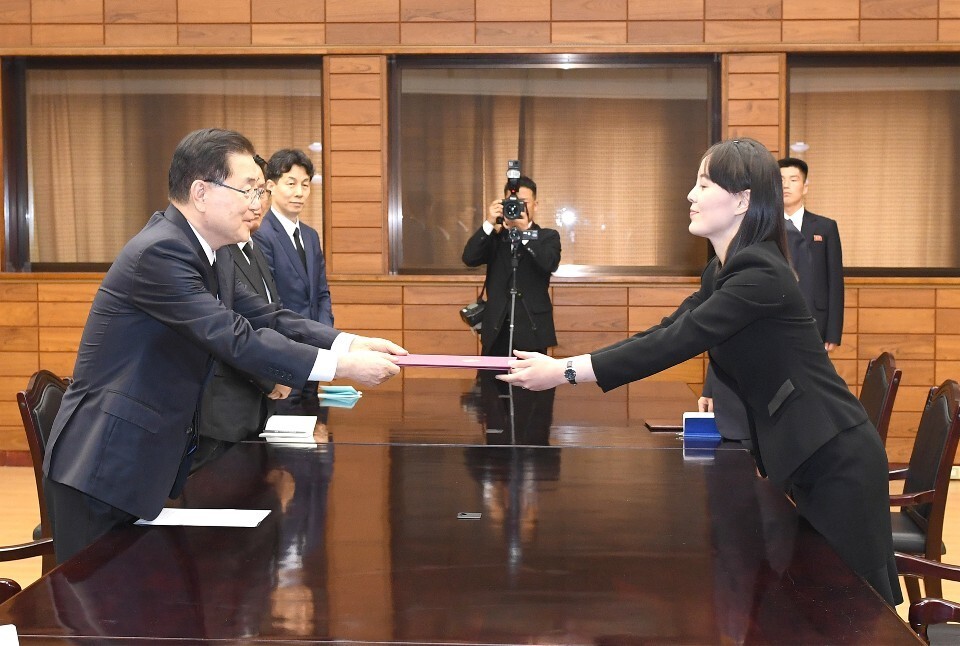hankyoreh
Links to other country sites 다른 나라 사이트 링크
Kim Yo-jong’s delivery of condolence wreath and message make front page of Rodong Sinmun

After North Korean leader Kim Jong-un had his younger sister Kim Yo-jong, first vice director of the Propaganda and Agitation Department of the Workers’ Party of Korea (WPK), deliver a floral wreath and message of condolence to the bereaved family members of Lee Hee-ho, chair of the Kim Dae-jung Peace Center, on the afternoon of June 12, Kim Yo-jong’s visit to Panmunjom made the front page of the June 13 edition of North Korea’s state-run Rodong Sinmun.
Along with a straightforward news article titled “Beloved Leader Kim Jong-un sends flowers and message of condolence to grieving family of Lee Hee-ho, wife of former President Kim Dae-jung,” the Rodong Sinmun, the official organ of the WPK Central Committee, printed the full text of the message of condolence under the title “To the grieving family of Lee Hee-ho.” The newspaper also ran three photos showing Kim Yo-jong meeting Chung Eui-yong, director of the Blue House National Security Office, and Park Jie-won, deputy chair of the Kim Dae-jung Peace Center, at the Tongilgak pavilion in Panmunjom and delivering the flowers and message to them.
By immediately informing the North Korean public about Kim’s delivery of the sympathy flowers and message of condolence — and that through front-page coverage in the Rodong Sinmun, the most authoritative publication in the country — North Korea appears to have been trying to maximize the political significance of the action. That also underlines that Kim remains committed to inter-Korean cooperation.
A political analysis piece titled “Implementing inter-Korean agreements is what our age demands” ran on page six of the Rodong Sinmun. “Improving inter-Korean relations can only be realized through the Korean people working together. We must bring an end to the mentality of toadyism and the policy of relying on foreign powers,” the piece argued, without singling out the South Korean authorities as the target of its criticism.
One notable feature of the coverage in the Rodong Sinmun— in contrast with several other less official propaganda outlets — is that it didn’t resort to dismissing humanitarian aid as a secondary concern in its criticism of South Korea. In recent weeks, propaganda outlets have repeatedly attacked and derided South Korea’s decision to provide humanitarian aid to the North through international organizations. “If they hope to show off with their sideshow about humanitarianism, they’ve miscalculated,” North Korean website Uriminzokkiri said. The stance taken by the Rodong Sinmun creates hopes that South Korea’s plans to provide the North with large amounts of food aid could lead the way to an improvement in inter-Korean relations.
By Lee Je-hun, senior staff writer
Please direct comments or questions to [english@hani.co.kr]

Editorial・opinion
![[Column] Has Korea, too, crossed the Rubicon on China? [Column] Has Korea, too, crossed the Rubicon on China?](https://flexible.img.hani.co.kr/flexible/normal/500/300/imgdb/original/2024/0419/9317135153409185.jpg) [Column] Has Korea, too, crossed the Rubicon on China?
[Column] Has Korea, too, crossed the Rubicon on China?![[Correspondent’s column] In Japan’s alliance with US, echoes of its past alliances with UK [Correspondent’s column] In Japan’s alliance with US, echoes of its past alliances with UK](https://flexible.img.hani.co.kr/flexible/normal/500/300/imgdb/original/2024/0419/2317135166563519.jpg) [Correspondent’s column] In Japan’s alliance with US, echoes of its past alliances with UK
[Correspondent’s column] In Japan’s alliance with US, echoes of its past alliances with UK- [Editorial] Does Yoon think the Korean public is wrong?
- [Editorial] As it bolsters its alliance with US, Japan must be accountable for past
- [Guest essay] Amending the Constitution is Yoon’s key to leaving office in public’s good graces
- [Editorial] 10 years on, lessons of Sewol tragedy must never be forgotten
- [Column] A death blow to Korea’s prosecutor politics
- [Correspondent’s column] The US and the end of Japanese pacifism
- [Guest essay] How Korea turned its trainee doctors into monsters
- [Guest essay] As someone who helped forge Seoul-Moscow ties, their status today troubles me
Most viewed articles
- 1[Column] The clock is ticking for Korea’s first lady
- 2Samsung barricades office as unionized workers strike for better conditions
- 3After 2 months of delayed, denied medical care, Koreans worry worst may be yet to come
- 4[Correspondent’s column] In Japan’s alliance with US, echoes of its past alliances with UK
- 5[Column] Has Korea, too, crossed the Rubicon on China?
- 6Hong Se-hwa, voice for tolerance whose memoir of exile touched a chord, dies at 76
- 7[Editorial] When the choice is kids or career, Korea will never overcome birth rate woes
- 8Constitutional Court rules to disband left-wing Unified Progressive Party
- 9Nearly 1 in 5 N. Korean defectors say they regret coming to S. Korea
- 10‘Right direction’: After judgment day from voters, Yoon shrugs off calls for change